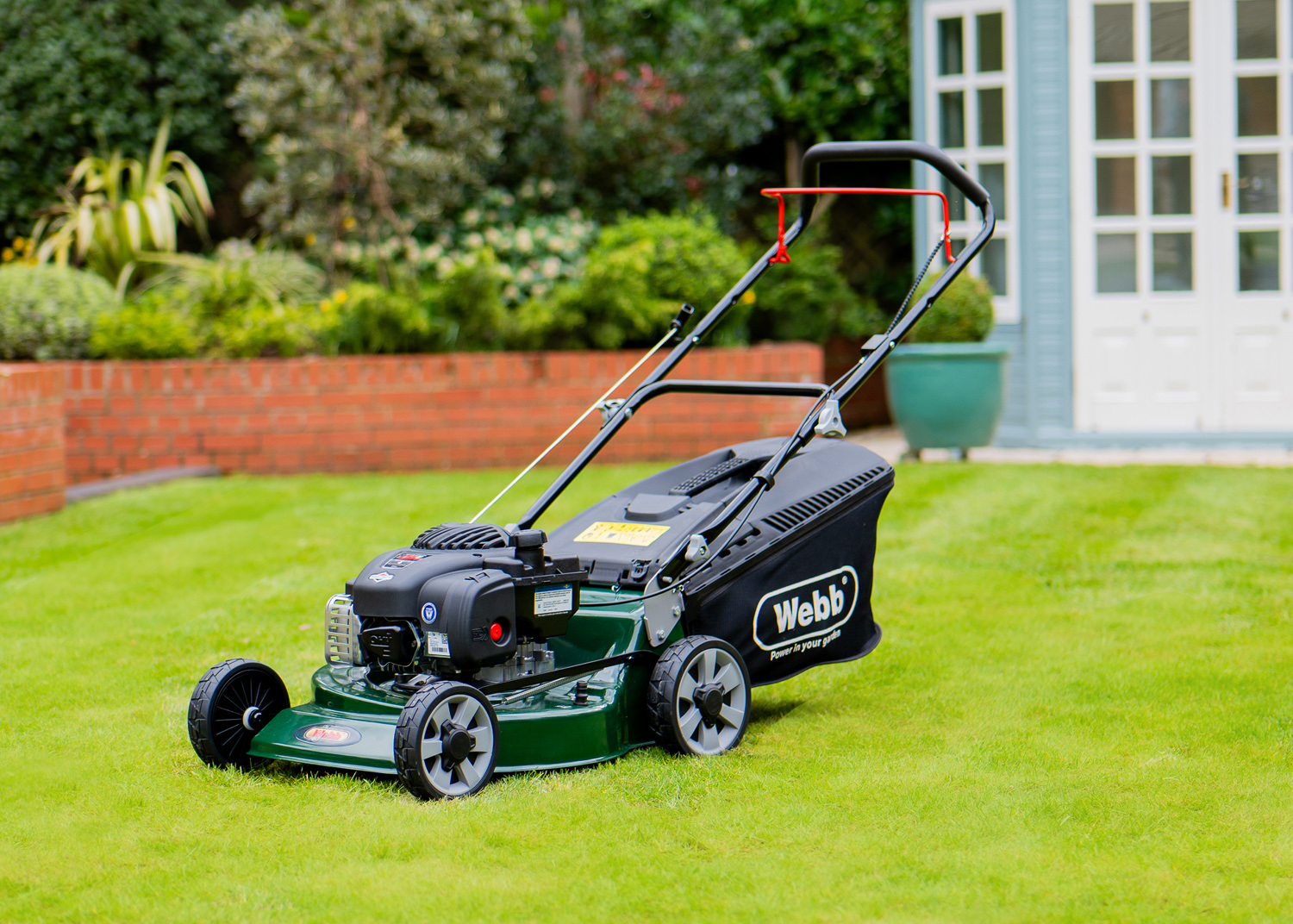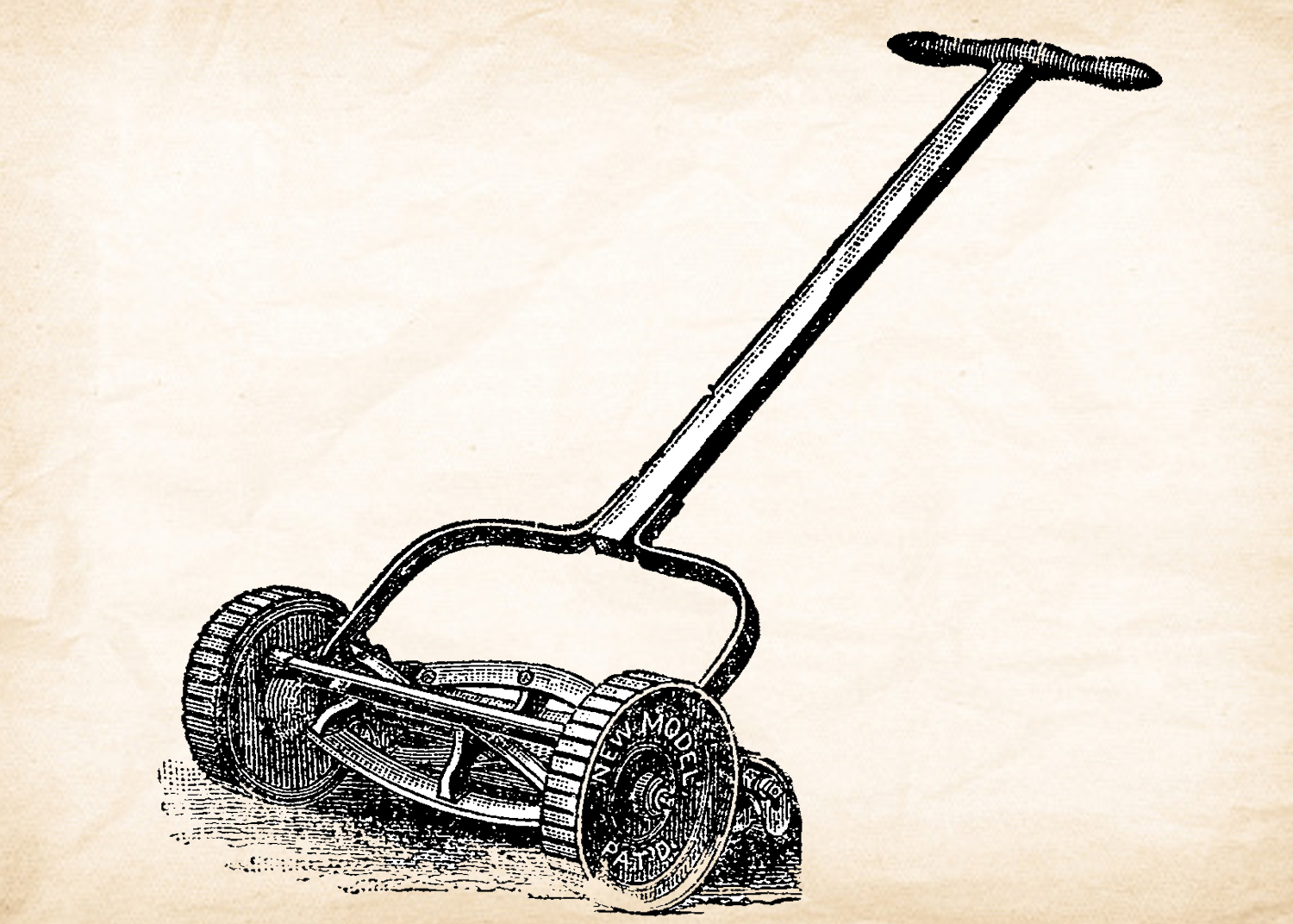A Beginner's Guide to Lawn Mowers
- By Nicki MacIntyre
- 2 Apr 2024
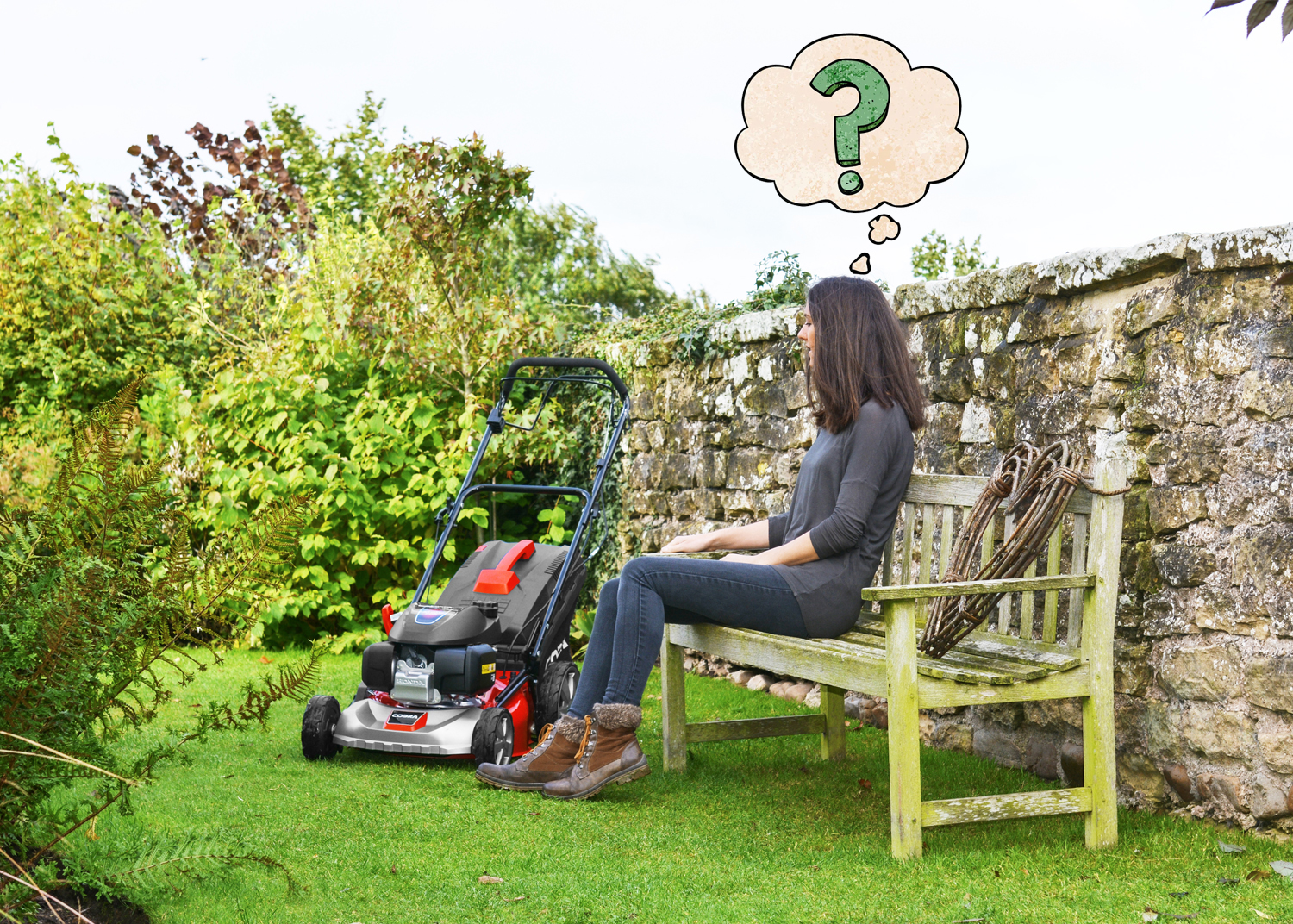
How to choose a lawn mower
The best place to start is by understanding the different types of lawn mowers available, as these can impact the quality of the cut and the evenness of your lawn. Certain lawn mowers are better suited to some lawns than others, and this is determined by factors such as power supply, lawn mower cost, cutting capabilities, the size and typography of your lawn and the desired lawn finish.
Which lawn mower should I buy?
Petrol lawn mowerLawn mowers with petrol engines are a versatile and powerful option that’s suited to all types of grass. Petrol lawn mowers do not need to be charged as there’s no battery required. The mower is powered by a petrol engine that requires petrol and oil to operate, and as a result, it tends to be the least environmentally-friendly and highest maintenance. Notwithstanding this, petrol lawn mowers remain the most popular choice for both domestic and commercial users. The Green Reaper recommends: |
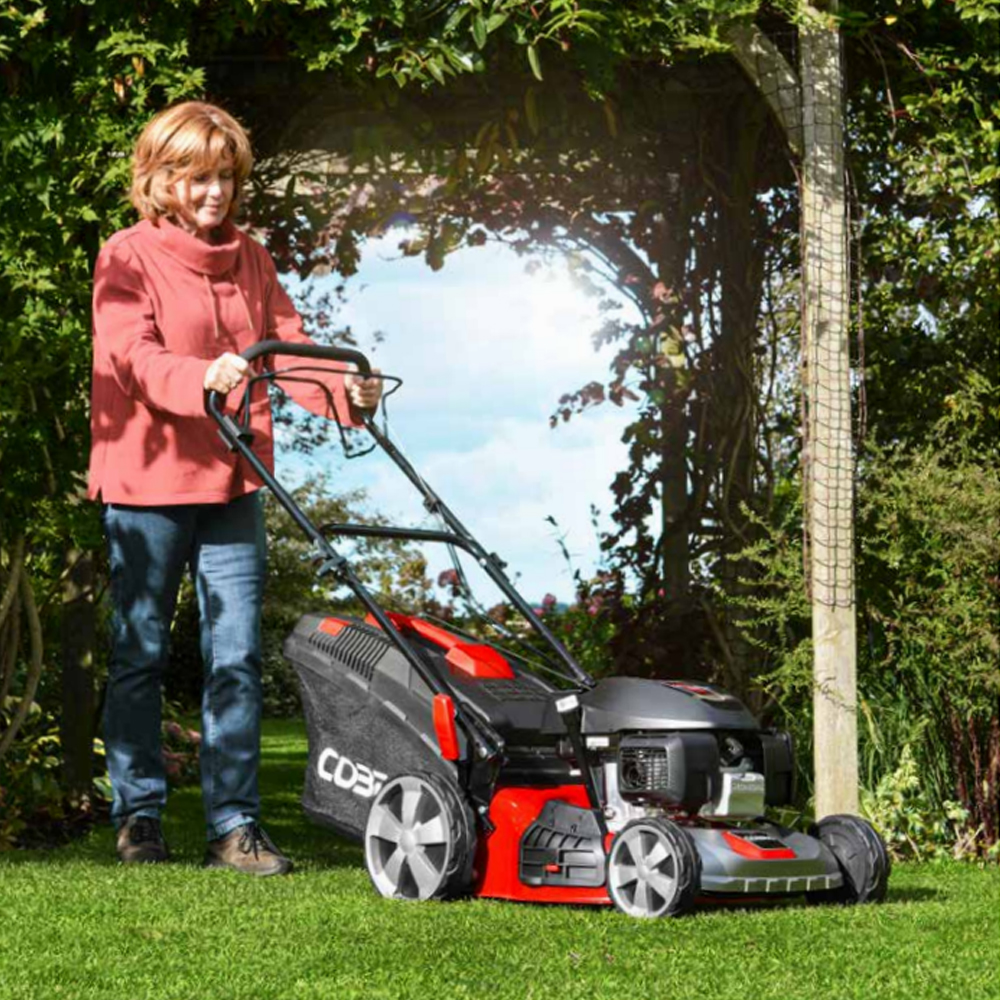 |
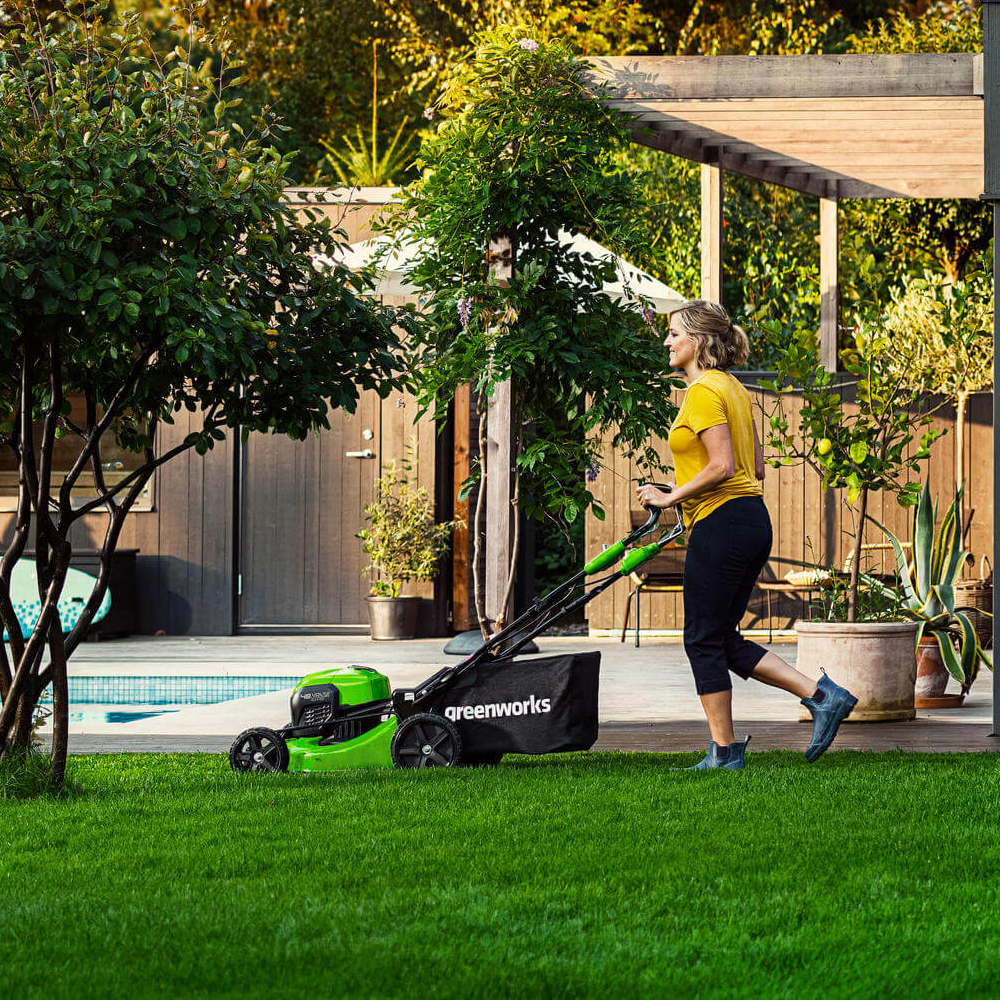 |
Cordless lawn mowerCordless lawn mowers don’t require a power cable to operate, which makes them a great choice if you’re looking for fuss-free mowing. Rather than relying on mains electricity, cordless mowers are battery-powered. With a lightweight design and quieter operation, cordless mowers are a hassle-free and eco-friendly alternative to petrol-powered mowers and a cable-free alternative to mains-electric-powered machines. The Green Reaper recommends: |
Electric lawn mowerMains-operated lawn mowers rely on electric power from a socket to operate. Suitable for smaller gardens and uncomplicated mowing needs, mains-electric-powered lawn mowers are incredibly simple to start and use, easy to maintain and come with various cable lengths, cutting widths and propulsion types (push or self-propelled). Many lawn mower brands manufacture mains-powered mowers to cater to different lawn sizes and individual requirements. The Green Reaper recommends: Flymo EasiStore 380R Electric Rotary Lawn Mower with Rear Roller |
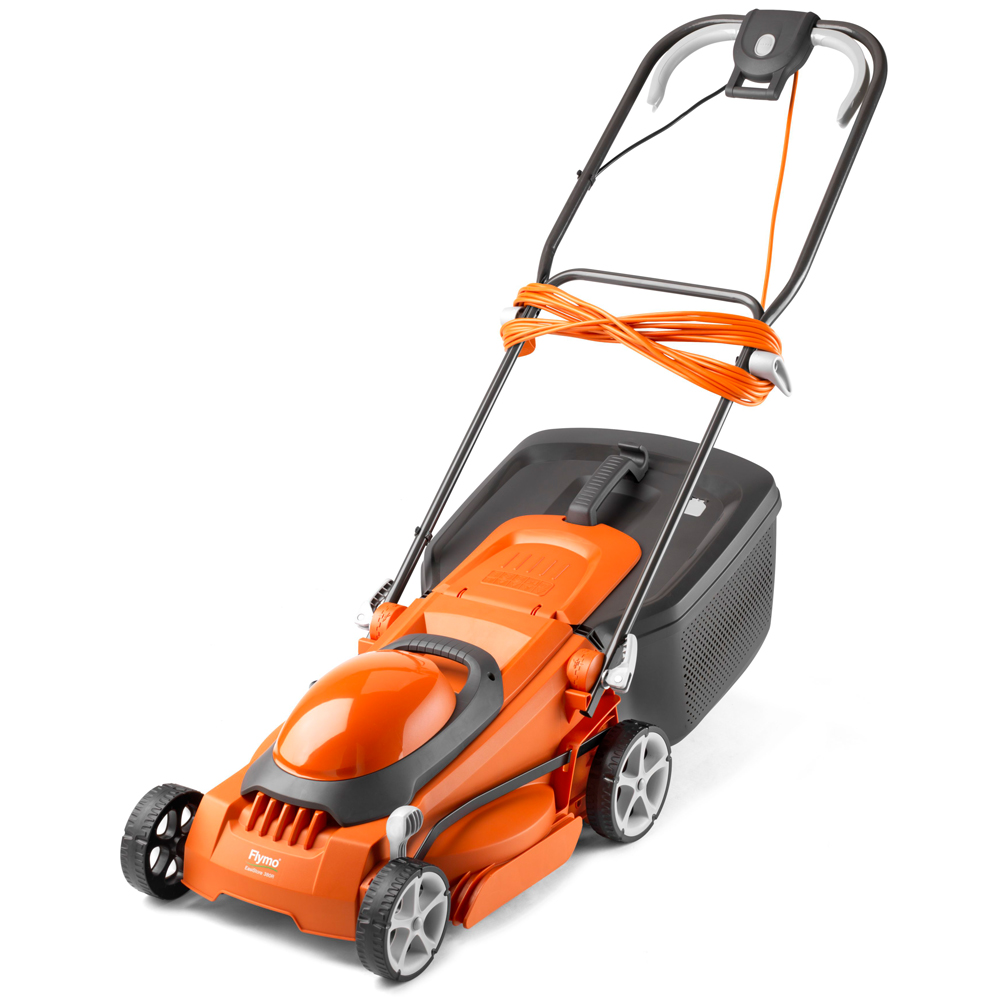 |
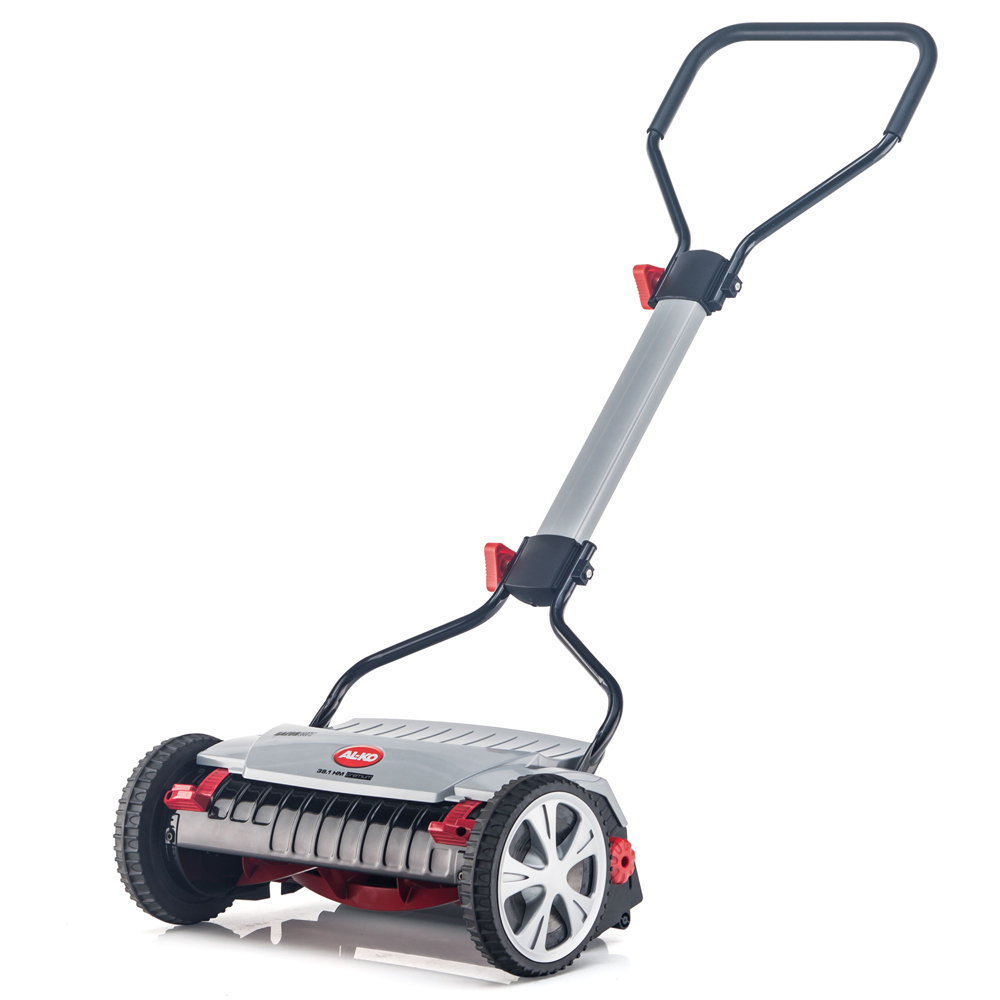 |
Hand powered lawn mowerHand-powered mowers rely on kinetic energy and don’t require a power source. All that’s needed is for the mower to be pushed forward, causing the blades to turn and cut the grass. Traditionally, a hand-propelled lawn mower has cylinder blades which produce a very fine, clean cut and a roller for a striped effect. The Green Reaper recommends: |
Ride-on lawn mowerRide-on lawn mowers do exactly what they say on the tin. They are the first step up from traditional walk-behind lawn mowers in that they feature a seat and a steering wheel, and are designed to be driven rather than pushed. Mini riders, which can be powered either by petrol engines or lithium-ion batteries, are a great time-saver for a larger lawn, but they are a bigger investment option! The Green Reaper recommends: Cobra LT62HRL 24" Hydrostatic Rear Collect Ride-On Lawn Mower |
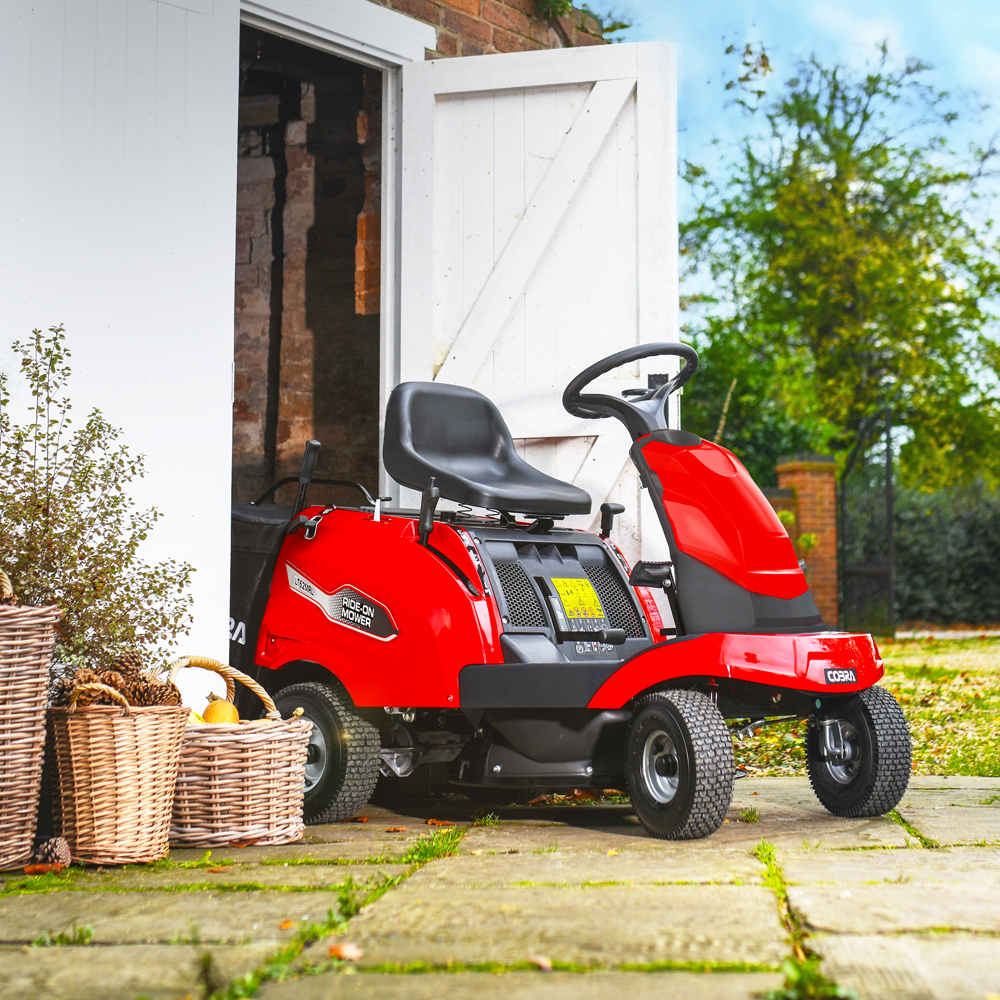 |
 |
Lawn tractorsLawn tractors are ideal for lawn areas of one acre and above. The design of a lawn tractor also differs in that the engine is located beneath the front bonnet of a lawn tractor as opposed to the back of a ride-on mower. The cutter deck is located centrally and is designed to offer different cutting options including mulching or collecting the grass, or a combination of both. Additionally, grass can be side or rear-discharged in areas with longer grass such as paddocks and orchards. Very easy to manoeuvre across varying terrains, the drive can be achieved either through manual gear selection or a hydrostatic (automatic) gearbox. The Green Reaper recommends: Cub Cadet XT1 OR106 Enduro Series 106cm/42" Direct Collect Hydrostatic Lawn Tractor |
Which type of lawn mower cutting mechanism is best?
Rotary lawn mowers
Rotary lawn mowers operate by using a rotating blade that cuts the grass at a rapid pace. Suitable for most types of lawn, rotary lawn mowers are one of the most popular and versatile options as they can manage smooth, domestic gardens as well as rough patches of lawn.
The Green Reaper recommends: Webb RR17SP Supreme 43cm (17") 3-in-1 Self-Propelled Rear Roller Petrol Lawn Mower
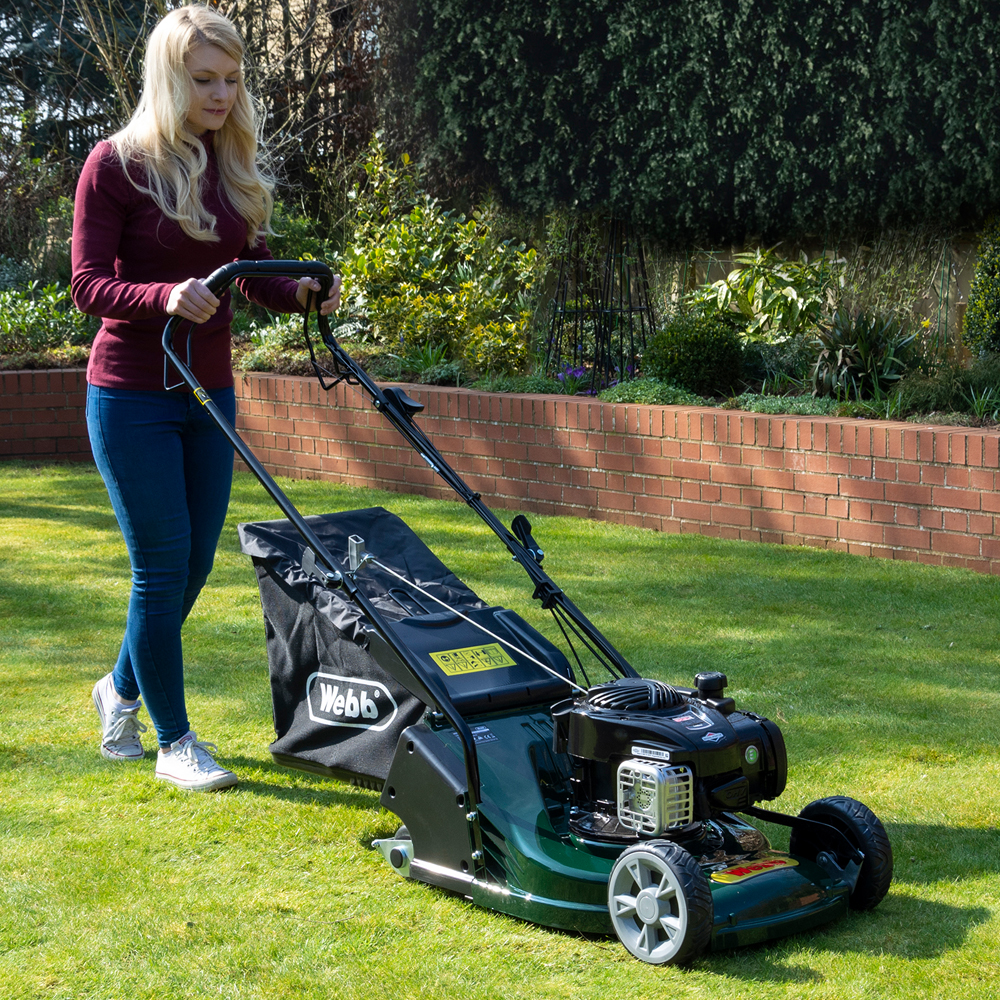
Cylinder lawn mowers
A cylinder lawn mower is a type of lawn mower that is designed for lawn perfectionists who desire the finest cut on level areas of ground. Cylinder lawn mowers offer a quality, cleaner cut than rotary mowers and are best suited to mow fine lawns and sports turf. Cylinder lawn mowers are undeniably the best lawn mowers for an immaculate and even finish. They have the bonus of front and rear rollers which achieve a light and dark striped effect.
The Green Reaper recommends: Cobra Fortis 17B 43cm/17" Self-Propelled Petrol Cylinder Lawn Mower
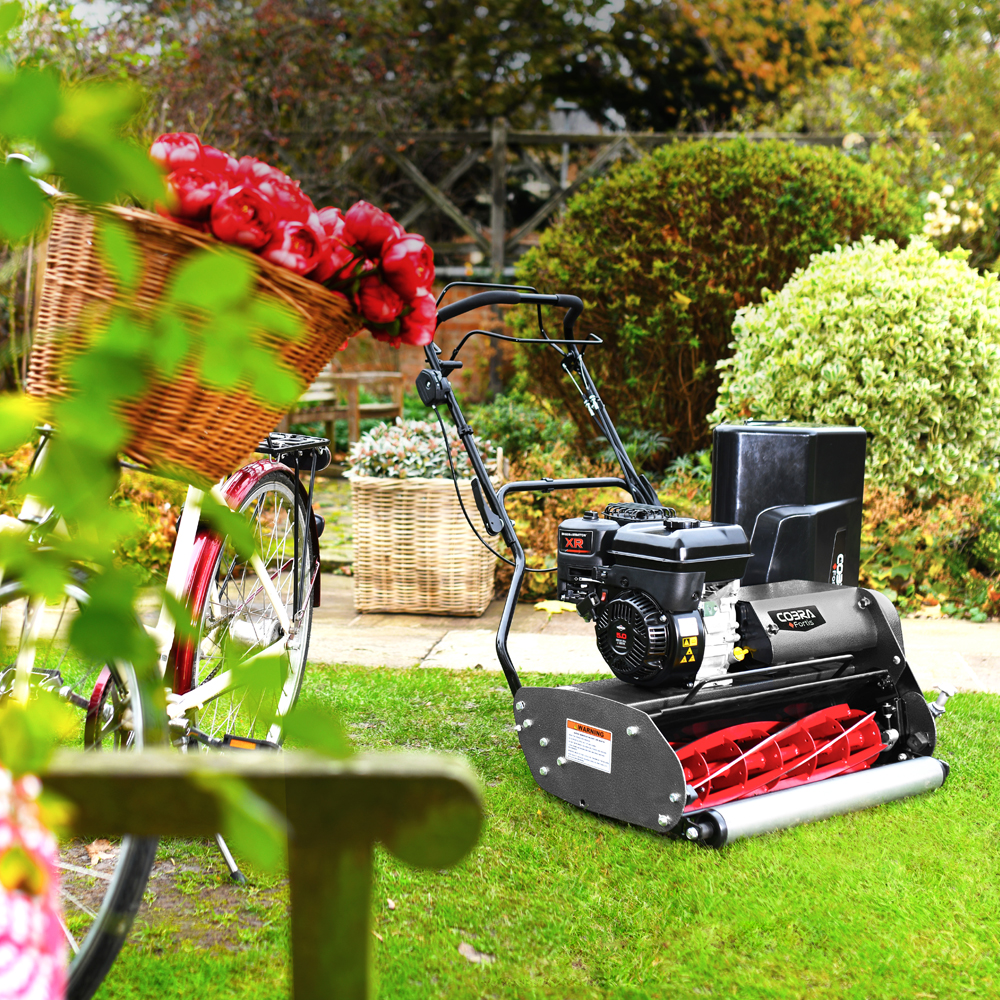
Hover lawn mowers
A hover mower works by creating a cushion of air between the lawn mower and the lawn. It features rotary cutting blades attached to a fan which blows air downwards, making the mower float above the ground. Hover mowers are light and extremely manoeuvrable, gliding in any direction, making them ideal for awkwardly shaped lawns and sloping areas. Two types of hover mowers are available; mulching or compaction collection.
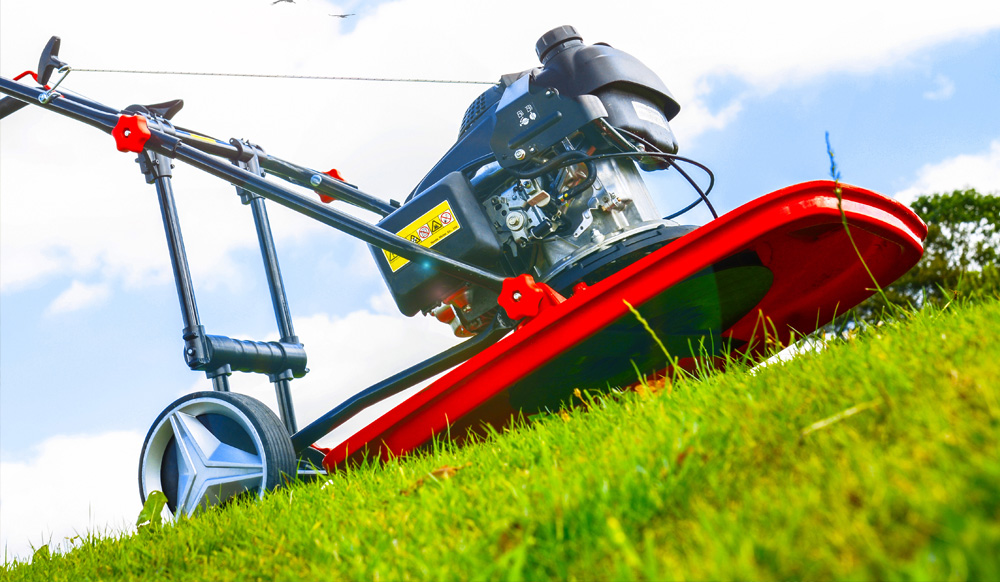
Lawn mower features and specifications
Self-propelled lawn mowers
Self-propelled lawn mowers do not require pushing to function. The forward, self-propelling motion of the mower is achieved via a gearbox driven from the engine.This type of lawn mower is a good choice for larger gardens or gardens with an inclined slope, as all the hard work is done for you.
Variable speed
Variable-speed lawn mowers allow you to control the speed at which the mower drives itself forward. Using controls on the handlebars, you can slow down around obstacles and corners, then speed up on the straights to suit both the operator and cutting conditions.
Deck material
The chassis of the lawn mower, also known as the deck, is the element of the lawn mower that houses the blade/s. Depending on the size and weight of your lawn mower, the deck material will differ. Deck materials for lawn mowers include steel and lightweight aluminium which need to be cared for and maintained to prevent rust and ensure longevity. Smaller lawn mower decks are usually made from lightweight and rust-resistant polypropylene. Deck washing ports are common in modern lawn mower designs, allowing you to clean the deck with ease by attaching a garden hose to the chassis.
Rear roller
A rear roller on a lawn mower is a valuable feature that creates a striped effect on the lawn, adding to its visual appeal. It features an in-built grass roller that bends and flattens the grass in the direction you are mowing after it has been cut to achieve polished, even lines across the lawn surface. Rear roller lawn mowers are perfect for professional lawn care and quality lawn maintenance that requires a striped appearance.
Blade brake clutch
The blade brake clutch is an in-built safety feature that lets the user stop the blade rotation without stopping the engine for the speedy, regular emptying of the grass collector. A blade brake clutch can be included on more expensive lawn mower models, such as professional lawn mowers It’s also handy for lawns or gardens where you may need to navigate between mowing areas over a path or driveway, reducing the risk of damaging the blade.
The Green Reaper recommends: Weibang Virtue 53 SSD BBC 3-in-1 3-Speed Self-Propelled Petrol Lawn Mower
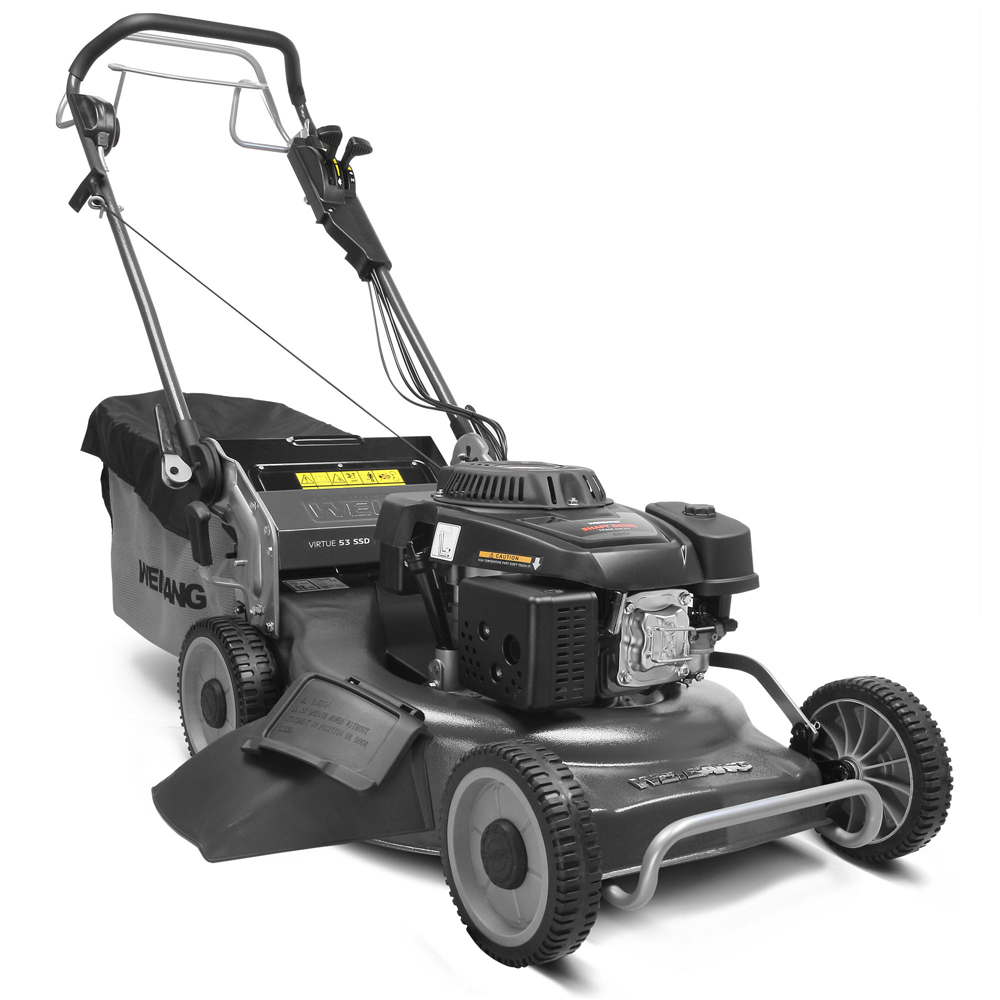
Grass clippings disposal
Lawn mower clippings disposal methods vary, and understanding how they work is essential for maintaining a healthy lawn. The most common clippings disposal option is grass collection into a bag. Alternatively, the clippings can be mulched, rear or side discharged back onto the lawn surface.
Grass bags collect the lawn cuttings while you’re cutting the grass. When the collector is full, it can be removed and emptied so you can dispose of your grass clippings on the compost or in your green recycling bin.
Mulching mowers are designed with special blades and decks that cut and re-cut the grass into smaller fragments before evenly distributing them across the lawn. This process creates a natural fertiliser and helps retain moisture and reduce weed growth, adding essential nutrients to the soil as it decomposes.
What to consider before buying a lawn mower
Usage specifications
Carry out research into the different types of lawn mowers to help determine which lawn mower is best suited to your needs. Consider things like the power source, size, weight and cost to help you narrow down your options.
Size of lawn
The size of your lawn is one of the most important considerations to make before buying a mower. The size of your lawn will dictate the amount of time your lawn care routine will need, which will naturally determine the type of lawn mower that suits your lawn best. For instance, if your lawn covers a larger, longer surface area with even strips of lawn, a lawn mower with more regimented control may be better suited. Smaller lawns with uneven grass and obstacles would be more suited to a lawn mower with more manoeuvrability. For an uneven lawn with raised patches and steep inclines, then a cordless hover lawn mower with a lightweight design offers far more flexibility and control.
Ease of use
The manoeuvrability and control are also vital elements in finding the most suitable lawn mower. Depending on the size and the configuration of your lawn, then the amount of control and flexibility of the lawn mower can make your job twice as easy or twice as hard!
Easier choices that are less strenuous on the body include a ride-on mower or a self-propelled mower. Lawn mowers which require more movability and manual input include a push-propelled lawn mower, or a heavier, bulkier petrol-powered lawn mower. All mains electric and battery-powered lawn mowers have push-button start and some have a lever for propulsion, which takes the effort out of pushing, meaning less manual input. Hand-powered lawn mowers will naturally require greater physical effort and energy, which is an important consideration to make if your garden requires lots of maintenance and covers a wider surface area.
Quality of your lawn
Another factor to consider before buying a lawn mower is the quality of your lawn, as the grass thickness and terrain quality will naturally affect the type of lawn mower blade mechanism you choose. Rotary lawn mowers are a better choice for unpredictable, uneven lawn surfaces with variable grass conditions. For large areas of high-quality, fine lawns that require regular maintenance to a high standard, a cylinder lawn mower would be best suited, offering the best consistency and neat finish.
Lawn mowing for beginners: FAQs
What size lawn mower do I need?
The grass will always need cutting, so you’ll always need a lawn mower. It’s that simple. The tricky bit is choosing the right deck size on a lawn mower to ensure you can cut the grass in a reasonable time and it does not become a chore, let’s look at some of the key factors you’ll need to consider.
What size cutting deck do I need?
A tennis court can be used as a rough guide for what size of lawn you have:
- Small garden – up to half a tennis court (up to 100m²)
- Medium garden – a tennis court (approximagely 150–200m²)
- Large garden – one and a half tennis courts (300m²+)
Lawn size in metre square recommended cutting width in cm
| 0-100m² | <33cm |
| 0-250m² | 33-39cm |
| 100-250m² | 40-46cm |
| 250-500m² | 46-48cm |
| 500-750m² | 46-56cm |
| 500-1000m² | 56cm> |
How much should I spend on a lawn mower?
A good quality battery-powered lawn mower may set you back as much as £600. Domestic lawn mowers cost anywhere between £100-£900. One of the cheapest options is a push-hand lawn mower, which can cost as little as £60. Electric main lawn mowers start at around £150, and the average petrol-powered lawn mower is around £300.
How to deal with grass clippings
To get rid of your grass clippings, you should either collect them in a bag or mulch them/ compost them. Your local council may offer a free or paid-for kerbside organic green waste collection. Creating your compost is an easy, cost-effective way to add nutrients to your plants and lawn. Mulching and leaving your grass clippings on the lawn provides a great natural fertiliser for your lawn.
How often should you mow your lawn?
The rate of grass growth and the desired height of your lawn determine how often you need to mow your lawn. Typically, mowing once a week during the growing season (March to October) should be ideal to keep your lawn healthy, neat, tidy and in good condition. The rest of the time, you can reduce the frequency of cutting to every other week, as and when necessary.
What's the most popular type of lawn mower?
A rotary lawn mower, these mowers are powered by a petrol engine, rechargeable battery or mains electricity. They are fitted with a horizontal metal blade on the drive shaft on the underside of the deck. The blade rotates at a very high speed, cutting the grass as it travels over the top of the lawn.


